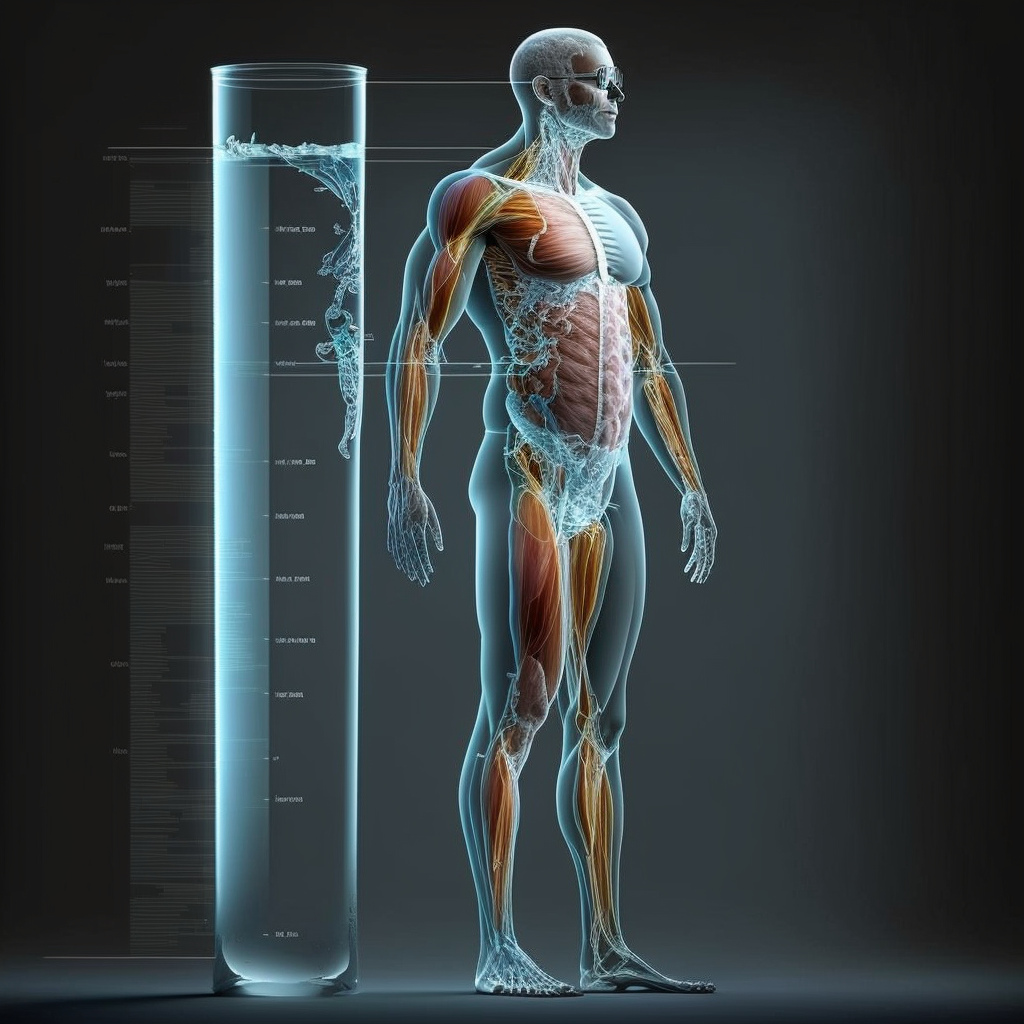Definition of hydration and the importance of water for the body.
Hydration refers to the process of providing the body with adequate amounts of water and electrolytes to maintain normal bodily functions. Water is essential for the body as it makes up a large percentage of the body’s composition and is involved in many vital processes, such as regulating body temperature, lubricating joints and tissues, transporting nutrients, removing waste products, and supporting organ function. Without proper hydration, the body may experience a range of negative health effects, including fatigue, dizziness, headaches, constipation, and even more serious conditions such as kidney stones and heatstroke. Therefore, it is crucial to maintain proper hydration levels by drinking enough water and consuming foods and beverages that contain electrolytes.
Overview of the benefits of drinking water.
Drinking water offers a wide range of benefits for the body and mind. Some of the key benefits of drinking water include:
- Regulating body temperature
- Lubricating joints and tissues
- Supporting organ function
- Promoting healthy skin
- Aiding digestion and preventing constipation
- Boosting the immune system
- Improving cognitive function and mood
- Reducing stress and anxiety
- Helping to maintain a healthy weight
- Preventing dehydration and associated negative health effects. Overall, drinking enough water is essential for maintaining good health and wellbeing.
Physical benefits.
Drinking water offers several physical benefits, which include:

- Regulating body temperature: Water helps regulate body temperature by sweating, which cools the body down as the sweat evaporates.
- Lubricating joints and tissues: Water helps lubricate joints and tissues, which can reduce friction and prevent joint pain and stiffness.
- Supporting organ function: Water is essential for proper organ function, such as the kidneys, which help remove waste and maintain electrolyte balance in the body.
- Promoting healthy skin: Water helps keep the skin hydrated and can prevent dryness, cracking, and flaking.
- Aiding digestion and preventing constipation: Drinking enough water can help prevent constipation and aid digestion by keeping the digestive tract hydrated and helping move food through the system.
- Boosting the immune system: Water can help boost the immune system by flushing out toxins and supporting the production of lymph, which helps fight off infections.
Overall, staying properly hydrated with water can improve physical health in numerous ways.
Helps maintain body temperature.
Yes, drinking water helps maintain body temperature. Water is an essential component of sweat, which is the body’s way of regulating temperature. When the body becomes overheated, the brain sends a signal to the sweat glands to produce sweat, which is mostly composed of water. As the sweat evaporates from the skin’s surface, it cools the body down, helping to maintain a healthy body temperature. However, if the body is dehydrated, it may not produce enough sweat to cool itself down, which can lead to overheating and heat-related illnesses. Therefore, staying properly hydrated with water is crucial for regulating body temperature and preventing heat-related health problems.
Lubricates joints and muscles.
Drinking water helps lubricate joints and muscles. Water is an essential component of synovial fluid, which is a thick, viscous liquid that lubricates joints and reduces friction between bones during movement. When joints are well-lubricated, they can move more freely and with less pain and stiffness. In addition, muscles also need water to function properly, and dehydration can cause muscle cramps and fatigue. Therefore, staying properly hydrated with water can help keep joints and muscles healthy and functioning optimally.
Promotes healthy skin.
Drinking water promotes healthy skin. Water helps to hydrate the skin, which can prevent dryness, flakiness, and dullness. It also helps to maintain the skin’s elasticity, which can prevent premature aging and the development of wrinkles. Proper hydration with water can also help to flush out toxins from the skin, reducing the risk of skin problems such as acne and inflammation. Additionally, water helps to promote good blood circulation, which can improve skin tone and help skin to appear more radiant. Overall, staying properly hydrated with water is important for maintaining healthy, youthful-looking skin.
Aids digestion and prevents constipation.
Drinking water aids digestion and prevents constipation. Water is essential for proper digestion and the absorption of nutrients in the body. It helps to break down food in the stomach and intestines, making it easier to digest and move through the digestive system. Additionally, water helps to keep the digestive tract hydrated, which can prevent constipation and make bowel movements easier to pass. When the body is dehydrated, it can cause the colon to pull water from stools, making them harder and more difficult to pass. Therefore, staying properly hydrated with water can help to promote healthy digestion and prevent constipation.
Boosts immune system.
Drinking water can boost the immune system. Water is essential for many of the body’s vital functions, including the immune system. It helps to flush toxins and waste products out of the body, which can reduce the burden on the immune system. Proper hydration can also help to support the production of lymph, a clear fluid that circulates throughout the body and helps to fight off infections. When the body is dehydrated, it can cause lymph production to slow down, making it harder for the body to fight off illness. Additionally, drinking water can help to prevent dehydration, which can weaken the immune system and increase the risk of illness. Therefore, staying properly hydrated with water can help to keep the immune system functioning optimally and reduce the risk of infection and disease.
Mental benefits.
Drinking water also offers several mental benefits, which include:
- Improving cognitive function and mood: Proper hydration with water can improve cognitive function, including attention, memory, and reaction time. It can also help to regulate mood and reduce the risk of depression and anxiety.
- Reducing stress and anxiety: Dehydration can increase stress levels and cause anxiety, while drinking enough water can help to reduce stress and promote feelings of calmness and relaxation.
- Enhancing sleep quality: Drinking water can help to prevent dehydration, which can interfere with sleep quality. Proper hydration can improve the quality and duration of sleep, which can have positive effects on overall mental health.
Overall, staying properly hydrated with water can improve mental health and wellbeing, promoting cognitive function, regulating mood, reducing stress, and improving sleep quality.
Improves cognitive function and mood.
Drinking water can improve cognitive function and mood. The brain needs water to function properly, and even mild dehydration can impair cognitive performance, including memory, attention, and reaction time. Proper hydration with water can help to improve cognitive function and enhance mental clarity and performance. Additionally, drinking enough water can help to regulate mood and reduce the risk of depression and anxiety. Dehydration can cause mood swings and irritability, while proper hydration can promote feelings of calmness and relaxation. Therefore, staying properly hydrated with water is important for maintaining good cognitive function and a positive mood.
Reduces stress and anxiety.
Drinking water can reduce stress and anxiety. Dehydration can increase stress levels and cause anxiety, while proper hydration with water can help to reduce stress and promote feelings of calmness and relaxation. The body’s stress response can cause the release of hormones that increase water loss through sweat and urination, leading to dehydration. Therefore, staying properly hydrated with water can help to prevent dehydration and reduce the physical and psychological effects of stress and anxiety. Additionally, drinking water can help to regulate the autonomic nervous system, which controls the body’s response to stress and can reduce the risk of stress-related health problems. Overall, staying properly hydrated with water is important for managing stress and anxiety and promoting overall mental health.
General guidelines for daily water intake.
The amount of water a person needs to drink per day can vary depending on factors such as their age, sex, weight, activity level, and climate. However, a general guideline for daily water intake is to drink at least 8-10 glasses (64-80 ounces) of water per day. This amount can help to prevent dehydration and maintain proper bodily function.
Another way to determine daily water intake is to use the “8×8 rule”, which is to drink 8 glasses of 8 ounces of water per day, totaling 64 ounces.
It’s also important to note that other fluids and foods, such as fruits and vegetables, can contribute to overall hydration. However, it’s still important to drink enough water to maintain proper hydration levels, particularly during hot weather, exercise, or illness when the body needs additional fluids. Consulting with a healthcare professional can also provide individualized recommendations on daily water intake based on an individual’s unique needs and circumstances.
Factors that influence water needs (e.g. activity level, climate, health status).

Several factors can influence a person’s water needs, including:
- Activity level: People who are more physically active tend to sweat more and require more water to replace lost fluids.
- Climate: People living in hot, humid climates may require more water to replace fluids lost through sweating, while those in cold or dry climates may need to drink more water to avoid dehydration.
- Health status: Certain health conditions, such as kidney disease or diabetes, may increase the body’s need for water, while medications such as diuretics can cause increased water loss and require additional fluid intake.
- Age: Infants and young children have higher water requirements per unit of body weight compared to adults, while older adults may be more susceptible to dehydration due to changes in the body’s ability to regulate water balance.
- Pregnancy and breastfeeding: Pregnant and breastfeeding women may need more water to support the increased demands on the body during these times.
- Gender: Men tend to have higher water requirements than women, as they have more muscle mass and tend to be more physically active.
Overall, individual water needs can vary widely depending on these and other factors. Therefore, it’s important to pay attention to the body’s thirst cues and drink enough water to maintain proper hydration levels.
Tips for staying hydrated throughout the day.
Here are some tips for staying hydrated throughout the day:
- Carry a water bottle: Keep a reusable water bottle with you throughout the day to make it easier to drink water and monitor your water intake.
- Set reminders: Use phone alarms or other reminders to prompt you to drink water throughout the day, particularly if you tend to forget.
- Eat water-rich foods: Fruits and vegetables, such as watermelon, strawberries, cucumbers, and celery, are high in water content and can help to supplement daily water intake.
- Monitor urine color: Urine color can be an indicator of hydration levels. Aim for a light, pale yellow color to ensure proper hydration.
- Drink before, during, and after exercise: Drink water before, during, and after physical activity to replenish fluids lost through sweat.
- Avoid sugary drinks: Sugary drinks such as soda and fruit juice can contribute to dehydration and are not a good source of hydration.
- Consider electrolyte drinks: In certain circumstances, such as prolonged physical activity or illness, electrolyte drinks can help to replenish lost fluids and electrolytes.
Overall, the key to staying hydrated throughout the day is to make drinking water a regular habit and to be mindful of the body’s thirst cues and other indicators of hydration levels.
Common symptoms of mild to severe dehydration.
Dehydration occurs when the body loses more fluids than it takes in, leading to an imbalance in water and electrolyte levels. Mild dehydration can often be resolved by drinking water, while severe dehydration can be a serious medical emergency that requires immediate attention. Here are some common symptoms of mild to severe dehydration:
Mild dehydration:
- Thirst
- Dry mouth and throat
- Dark yellow urine
- Reduced urine output
- Dry skin
- Headache
- Fatigue
- Dizziness
- Muscle cramps
- Dry or sticky mouth
Moderate dehydration:
- Increased heart rate
- Rapid breathing
- Sunken eyes
- Dry and cool skin
- Dizziness or lightheadedness
- Confusion
- Reduced sweating
- Dark urine with strong odor
Severe dehydration:
- Rapid heartbeat
- Rapid breathing
- Sunken fontanelle (soft spot on a baby’s head)
- Very dry skin
- Low blood pressure
- Weakness or lethargy
- Seizures
- Shock
- Delirium or unconsciousness
It’s important to seek medical attention immediately if you or someone you know experiences symptoms of severe dehydration. Mild to moderate dehydration can often be treated by drinking fluids or consuming electrolyte drinks, while severe dehydration may require intravenous fluids or other medical interventions.
Risks of chronic dehydration.
Chronic dehydration is a long-term condition where the body consistently loses more fluids than it takes in, leading to an ongoing imbalance in water and electrolyte levels. This can have serious implications for overall health and well-being. Here are some of the risks of chronic dehydration:

- Kidney damage: Chronic dehydration can lead to the formation of kidney stones and can also increase the risk of developing chronic kidney disease.
- Digestive issues: Chronic dehydration can cause digestive problems such as constipation, acid reflux, and stomach ulcers.
- Reduced cognitive function: Studies have shown that even mild dehydration can impair cognitive function and lead to issues with memory, concentration, and overall mental performance.
- Increased risk of infections: Dehydration can weaken the immune system and increase the risk of infections, particularly urinary tract infections (UTIs).
- Skin problems: Chronic dehydration can contribute to skin problems such as dryness, flakiness, and premature aging.
- Cardiovascular issues: Chronic dehydration can lead to cardiovascular problems such as low blood pressure, rapid heart rate, and blood clots.
Overall, it’s important to stay properly hydrated to maintain optimal health and prevent the long-term risks associated with chronic dehydration. If you suspect that you may be chronically dehydrated, speak to a healthcare professional to develop a plan to increase your fluid intake and address any underlying health issues.
Recap of the benefits of drinking water and staying hydrated.
Here are the benefits of drinking water and staying hydrated:
- Helps regulate body temperature.
- Lubricates joints and muscles.
- Promotes healthy skin.
- Aids digestion and prevents constipation.
- Boosts immune system.
- Improves cognitive function and mood.
- Reduces stress and anxiety.
- Prevents headaches and migraines.
- Improves physical performance.
- Prevents kidney stones and other kidney-related issues.
- Promotes weight loss and healthy weight maintenance.
- Reduces the risk of certain diseases such as bladder, breast, and colon cancer.
To stay hydrated throughout the day, it’s recommended to drink 8-10 glasses of water or other fluids each day, and more if you are exercising or in a hot climate. Other factors that may influence your water needs include your activity level, climate, and health status. To stay hydrated, carry a reusable water bottle, set reminders to drink water, eat water-rich foods, and avoid sugary drinks. If you experience symptoms of dehydration, such as thirst, dry mouth, and dark urine, be sure to drink water and electrolyte drinks and seek medical attention if symptoms persist.
Encouragement to make hydration a priority in daily life.
Staying hydrated is one of the simplest and most important things you can do for your health and well-being. Not only does it have numerous physical and mental benefits, but it can also prevent serious health issues and increase your overall quality of life. Making hydration a priority in your daily life is a small but powerful step towards better health.
Here are some reasons to encourage you to prioritize hydration:
- Improved physical and mental performance: Staying hydrated helps your body and mind work at their best, improving physical performance and mental clarity.
- Reduced risk of health issues: Staying properly hydrated can reduce the risk of health issues such as kidney stones, urinary tract infections, and certain types of cancer.
- Increased energy levels: When you’re dehydrated, your body has to work harder to perform basic functions, leading to feelings of fatigue and low energy. Staying hydrated can help boost your energy levels and keep you feeling alert and focused.
- Better skin health: Drinking water helps keep your skin moisturized and can reduce the appearance of fine lines and wrinkles.
- Weight management: Drinking water can help you feel fuller and reduce your overall calorie intake, which can aid in weight loss and healthy weight maintenance.
Remember that making hydration a priority doesn’t have to be difficult or time-consuming. Simple steps like carrying a water bottle with you, setting reminders to drink water, and eating water-rich foods can all contribute to a healthier, more hydrated you. So start today and make staying hydrated a daily habit for better health and well-being.

